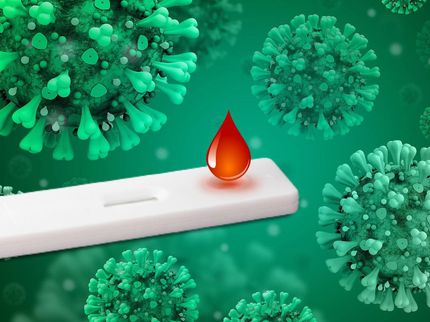Two-Stage Amplifier Coupling two enzymatic reactions: sensitive detection for immunological ELISA tests
Bioanalytical and diagnostic test methods are often based on the recognition of biomolecules by other biomolecules. However, biochemical events such as these are not directly detectable and must first be converted into physical signals, for example an electrical or optical signal. Since transient and minute amounts of substance are usually involved, which must be detected in very small test volumes, an effective "amplifier" must be employed. Enzyme reactions are a good choice as amplifiers and signal transformers: a single enzyme molecule generates a large number of detectable (e.g. fluorescent) molecules, which can be detected easily. This principle is also the basis of a well-established method, the enzyme-labeled immunosorbant assay (ELISA).
Researchers in Jerusalem have now developed a new ELISA protocol that utilizes two successive enzyme reactions. Enzyme 1 produces many copies of enzyme 2, which in turn produces many copies of a detectable fluorescent dye. In this way, the amplification effect is increased, and the assay is much more sensitive. The research group of Itamar Willner has used this new protocol to develop an ELISA test for telomerase, an important cancer marker. In comparison with traditional telomerase assays, the new method is considerably simpler, more efficient, and more sensitive.
This is how it works: Anti-telomerase antibodies are immobilized on a carrier, to which the test sample is added. The telomerase in the sample adheres to the antibodies. In the next step, another telomerase antibody is added, which recognizes the bound telomerase and binds to it. The trick: this second antibody is fitted with a binding site for a molecular "adaptor". An ecarin enzyme fitted with such an adapter can thus bind to it. Now, the two-stage amplifier can kick in: ecarin converts added prothrombin into thrombin (a reaction that incidentally plays a role in blood clotting). Thrombin is a biocatalyst that is able to liberate the fluorescent dye rhodamine from a nonfluorescent precursor. By measuring the fluorescence, the researchers were able to detect the telomerase from only 1000 cancer cells-an amount that is not detectable using previous detection methods.
The method of nonlinear amplification through coupled enzyme reactions is not only suitable for immunoassays but also for the detection of specific DNA sequences.
Most read news
Topics
Organizations
Other news from the department science

Get the analytics and lab tech industry in your inbox
By submitting this form you agree that LUMITOS AG will send you the newsletter(s) selected above by email. Your data will not be passed on to third parties. Your data will be stored and processed in accordance with our data protection regulations. LUMITOS may contact you by email for the purpose of advertising or market and opinion surveys. You can revoke your consent at any time without giving reasons to LUMITOS AG, Ernst-Augustin-Str. 2, 12489 Berlin, Germany or by e-mail at revoke@lumitos.com with effect for the future. In addition, each email contains a link to unsubscribe from the corresponding newsletter.
Most read news
More news from our other portals
See the theme worlds for related content
Topic world Antibodies
Antibodies are specialized molecules of our immune system that can specifically recognize and neutralize pathogens or foreign substances. Antibody research in biotech and pharma has recognized this natural defense potential and is working intensively to make it therapeutically useful. From monoclonal antibodies used against cancer or autoimmune diseases to antibody-drug conjugates that specifically transport drugs to disease cells - the possibilities are enormous

Topic world Antibodies
Antibodies are specialized molecules of our immune system that can specifically recognize and neutralize pathogens or foreign substances. Antibody research in biotech and pharma has recognized this natural defense potential and is working intensively to make it therapeutically useful. From monoclonal antibodies used against cancer or autoimmune diseases to antibody-drug conjugates that specifically transport drugs to disease cells - the possibilities are enormous






















































